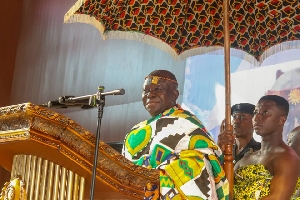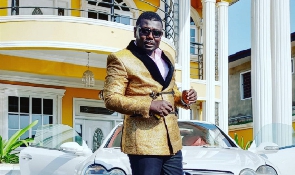Opinions of Thursday, 25 November 2010
Columnist: Darko, Otchere
We Need To Change The Composition Of The Council Of State
By Otchere Darko
Our current presidential system which is based on a unicameral legislature lacks one vital tool needed for effective “checks and balance” of power among the three arms of State....... that is, the absence of an Upper House. In systems where there are Upper Houses, presidential powers are checked more strenuously than where there are one-chamber houses. Making up for this deficiency, may partly explain why the Council of State was put in place by the 1992 Constitution..... even though its role is purely “to counsel the President in the performance of his functions”. Article 90 of the Constitution allows the President to refer bills published in the Gazette, or passed by Parliament to the Council of State, if he wishes. This provision, thus, makes the role of the Council of State slightly similar to the legislative role of an Upper House, wherever it exists. However, three things reduce the strength of influence that our Council of State can exercise over legislations, despite Article 90. Firstly, out of a total membership of 25, only ten are elected through rules set up by the Electoral Commission. The rest are appointed either by the President alone, [11 in number]; or by the President in consultation with Parliament, [3 in number]. Then, there is one person who is neither elected by people, nor appointed by the President. This member is the President of the National House of Chiefs. The smallness of the elected members weakens any “checks and balance role” that the Council could, and should exercise over both the Executive and Parliament. Secondly, it is not mandatory for all bills to be sent to the Council. The President can decide not to request a bill to be sent, because Article 90 does not make it compulsory. Thirdly, since the role of the Council of State is advisory, even where it has made an amendment to a bill referred to it, or where it decides not to endorse a proposed amendment made by the President to a bill passed by Parliament and referred to its members, the President, in both cases, is not bound to accept any conclusions by the Council. In effect, by its nature, the Council of State is not in a position to exercise any checking and balancing control over the President, nor the majority in parliament, with respect to law-making. It merely rubberstamps any legislation referred to it by the President.
In my opinion, the Council of State, as constituted, is bogus, useless, and a waste of the taxpayer’s money. The numerous political frictions in the country between NDC and NPP, between Rawlings and Kufuor, between the Executive and the Judiciary, etc, would not have occurred if the Council was relevant, independent and balanced, in ways consistent with such a nationally important and august body. Its advisory role is heavily compromised by its lack of independence. Similarly, in respect of its legislative role as it concerns bills referred to it, one can also say that the composition of its membership reduces its ability to exercise any “checks and balance influence” over the President, or over Parliament. The one person who is not appointed and the ten elected members, put together, do not form a majority over the Presidential appointees who total 14 in number. The creation of the Council of State is, therefore, one of the biggest “jokes” of the 1992 Constitution; and this needs to be rectified. We need to have in place of the current Council of State, an organ of State over which the President, or our unicameral Legislature cannot exercise any control or influence. In my view, we need to replace the current Council of State with one that is either fully “elected”, or fully “unelected”, but also “un-appointed”. The total membership of such a body could still be pegged at 25 to ensure that the replacement does not lead to an increase in cost. We can call that new body an Upper House or we may continue to call it a Council of State. The name should not matter. It is the composition of, and the roles assigned to this new body that should matter. In view of our “democratic immaturity”, which shows clearly through the way we comport ourselves in all forms of partisan elections..... especially the behaviour of members and supporters of the two biggest parties, I am personally worried about creating any such big body that is elected in our current democratic environment to constitute an Upper House or a Council of State. Instead, I would prefer a replacement of the current Council by members made up of 25 “unelected”, but also “un-appointed” people. The said “unelected” and “un-appointed” members could be constituted as follows:-
(i) One member each from the ten regional houses of chiefs chosen by the regional houses of chiefs themselves, plus the President of the National House of Chiefs, making a total of eleven chiefs;
(ii) One member each from the Christian and Moslem Councils making a total of two religious members chosen by themselves;
(iii) Two members from the Bar Association chosen by members themselves;
(iv) Two members from the Chamber of Commerce chosen by members themselves;
(v) Two members from the Association of Ghanaian Manufacturers chosen by members themselves;
(vi) Two members from the Universities chosen by members of all existing Ghanaian University associations, private and public;
(vii) Five co-opted members who would be co-opted by the twenty specified members above and who should be experienced but retired Ghanaians co-opted, one each, from these groups of former public office holders:- former Chief Justices, former Chiefs of Defence Staff of the Ghana Armed Forces, former Inspector-Generals of Police, former Heads of the Public/Civil Services, and former Trades Union Chiefs...... after the 20 specified members have constituted and first sat officially as Council of State.
The total number of members...... specified plus co-opted members, would be twenty five...... which would be the same as the current total membership of the current Council of State. This new Council could then be given more, and specific responsibilities that would then make it possible for it to play both counselling roles to the President and “checking and balancing roles” to the Executive, Parliament and the Judiciary, in ways that even an elected Upper House could not properly play, because of the latter’s partisanship. It could also be assigned specified reconciliatory roles wherever and whenever necessary, such as between two parties, or between two former Heads of State. Once the Council of State is constituted as set out above for a period specified by law and unrelated to the Presidential term of office, a change of Government should not lead to a change of membership of the Council. This will reduce its susceptibility to partisanship and guarantee its independence and effectiveness.
*People who are regular readers of the columnists’ section of Ghanaweb may know that I constantly bash out on chiefs; and suggest that modifications should be made to the institution of chieftaincy, because of the numerous problems that afflict it. Some readers have erroneously described me as “anti-chieftaincy propagandist”, “anti-traditionalist”, or even “anti-African”. I am neither of these. Rather, I am a supporter of chieftaincy, because I strongly believe that we can never, and should never get rid of our traditions and culture. What I have been doing is akin to, for example, telling your best friend to polish his shoes; [because you believe the shoes are dirty]. Telling your friend that, does not mean that you hate his shoes, and that you want him to throw them away. We need to “polish the institution of chieftaincy” and use it “better”. That is all I have been saying! We still have to use our chiefs, because they form an important part of our society, despite the fact that we still need to remove those aspects of them that create disputes and other problems.
Source: Otchere Darko. [This writer is a centrist, semi-liberalist, pragmatist, an advocate for “inter-ethnic cooperation and unity” and a community-based development protagonist. He opposes the negative, corrupt, and domineering politics of NDC and NPP; actively campaigns for the development and strengthening of “third parties”; and opposes a two-party only system of democracy in Ghana.]












